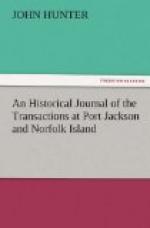From what has been said, it may be seen how impossible it was to detach a body of convicts to any distance, if there had been any necessity for it. The land at Rose-Hill is very good, and in every respect well calculated for arable and pasture ground, though it be loaded with timber, the removal of which requires great labour and time; but this is the case with the whole country, as far as had been seen, particular spots excepted. As the good land could not at present be cultivated by the colonists, it was reserved for the first settlers that should come out.
The consequence of a failure of a crop, when the colony can no longer expect supplies from Great-Britain, is obvious; and to guard against such consequences, it would be of great use to have a few settlers, to whom great encouragement should be given. The fixing the first settlers in townships would, indeed, tend to prevent that increase of live stock, which might be raised in farms at a distance from villages, where the stock would be less liable to suffer from the depredations, which may be expected from the soldier and the convict, and against which there is no effectual security.
The many untoward circumstances which the colony had hitherto met with were done away; and at length there was reason to hope, that after two years from July, 1790, they would want no farther supply of flour, though various accidents might render a supply necessary after that period. How long a regular supply of beef and pork would be necessary depended on the quantity of live stock which might be introduced into the settlement, and on its increase, of which no judgment could be formed.
A town was now laid out at Rose-Hill, of which the principal street was to be occupied by the convicts: the huts were building at the distance of one hundred feet from each other, and each hut was to contain ten convicts. In these huts they will live more comfortably than they could possibly do if numbers were confined together in larger buildings; and having good gardens to cultivate, and frequent opportunities to exchange vegetables for little necessaries which the stores do not furnish; these accommodations will make them feel the benefits they may draw from their industry.
Some few inconveniences, indeed, ensue from the convicts being so much dispersed, but their being indulged with having their own gardens is a spur to industry, which they would not have, if employed in a public garden, though entirely for their own benefits, as they never seemed to think it was their own; and it was not observed, that many of those who had been for some months in huts, and consequently were more at liberty than they would be if numbers were confined together, had abused the confidence placed in them, any farther than the robbing of a garden.
A GENERAL RETURN of MALE CONVICTS, with their respective employments, on the 23d of July, 1790.
AT SYDNEY.




